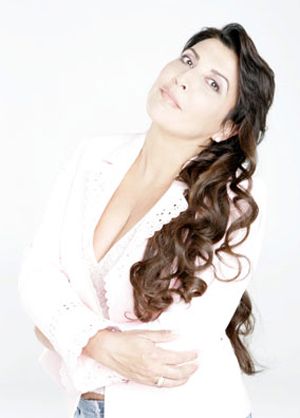
Maria Guleghina is one of the most celebrated and acclaimed sopranos in the world. Her performances are invariably rewarded with standing ovations at the world’s leading opera houses. She has been described as the “Cinderella from Russia”, a “Russian soprano with Verdi flowing through her veins” and a “vocal miracle”. She is particularly noted for her interpretation of the title role in Tosca. Her repertoire also includes the title roles in Aida, Manon Lescaut, Norma, Fedora, Turandot and Adriana Lecouvreur, as well as Lady Macbeth in Macbeth, Abigaille in Nabucco, Violetta in La traviata, Leonora in I trovatore, Oberto and La forza del destino, Elvira in Ernani, Elisabeth in Don Carlo, Amelia in Simon Boccanegra and Un ballo in maschera, Lucrezia in I due Foscari, Desdemona in Otello, Santuzza in Cavalleria rusticana, Maddalena in Andrea Chénier, Lisa in The Queen of Spades and Odabella in Attila among others.
Maria Guleghina began her professional career at the State Opera in Minsk, and one year later she made her debut at La Scala as Amelia in Un ballo in maschera under maestro Gavazzeni opposite Luciano Pavarotti. Her voice of great power, warmth and energy and her immense acting skills have made her a regular and welcome guest throughout the world. At La Scala she has performed in fourteen new productions, appearing as Lucrezia in I due Foscari, Tosca, Fedora, Lady Macbeth in Macbeth, Lisa in The Queen of Spades, Manon Lescaut, Abigaille in Nabucco and Leonora in La forza del destino, conducted by Riccardo Muti in Tokyo. She has accompanied La Scala on two tours to Japan in 1991 and 1999. She has also performed two solo recitals at this legendary theatre.
Since her 1991 debut at the Metropolitan Opera as Maddalena in a new production of Andrea Chénier opposite Luciano Pavarotti, she has performed there over one hundred and thirty times as Tosca, Aida, Norma, Adriana Lecouvreur, Santuzza in Cavalleria rusticana, Abigaille in Nabucco, Lisa in The Queen of Spades, Dolly in Sly, Giorgetta in Il tabarro and Lady Macbeth in Macbeth. In 1991 she made her Wiener Staatsoper debut in Andrea Chénier and has returned to perform as Lisa in The Queen of Spades, Tosca, Aida, Elvira in Ernani, Lady Macbeth in Macbeth, Leonora in Il trovatore and Abigaille in Nabucco.
Before her 1995 stage debut at the Royal Opera House, Covent Garden, where she performed the title role in Fedora opposite Plácido Domingo, she had already performed in a critically acclaimed concert performance of Ernani at the Barbican with the Royal Opera. This was followed by a highly successful recital at the Wigmore Hall. Her other appearances at Covent Garden include Tosca, concert performances of Andrea Chénier, Odabella in Attila and most recently Lady Macbeth in Macbeth.
In 1996 Maria Guleghina’s debut at the Arena di Verona was as Abigaille in Nabucco where she was awarded the Giovanni Zanatello Prize for a sensational debut performer. She has since performed there on numerous occasions. In 1997 Maria Guleghina made her Opéra de Paris debut with the title role in Tosca and has since returned as Lady Macbeth in Macbeth, Abigaille in Nabucco and Odabella in Attila.
Maria Guleghina has longstanding links with Japan, a country where she has become very well known. In 1990 Maria Guleghina performed as Leonora in Il trovatore and recorded Otello there with Renato Bruson under the baton of Gustav Kuhn. In 1996 she returned to Japan for performances of Il trovatore at the National Opera. She subsequently performed Tosca with the Metropolitan Opera in Japan and in the same year took part in the inauguration of the New National Theatre of Tokyo in a new production of Aida by Franco Zeffirelli. In 1999 and 2000 Maria Guleghina gave two solo recital tours in Japan and recorded two solo CDs. She also toured to Japan with La Scala as Leonora in La forza del destino and with the Washington Opera as Tosca. In 2004 Maria Guleghina toured Japan in her world debut as Violetta in La traviata.
Maria Guleghina has performed solo recitals all over the world, taking her to La Scala, the Liceu, the Opéra de Lille, São Paolo, Wigmore Hall, Suntory Hall, the Mariinsky Theatre, Osaka, Kyoto, Hong Kong, Rome and Moscow. Many of the productions in which she has appeared have been broadcast on radio as well as being televised. These include Tosca, The Queen of Spades, Andrea Chénier, Sly, Nabucco, Cavalleria rusticana, Il tabarro, Norma and Macbeth from the Metropolitan Opera, Tosca, Manon Lescaut and Un ballo in maschera from La Scala, Attila from the Opéra de Paris, Nabucco from the Wiener Staatsoper and solo recitals from Japan, Barcelona, Moscow, Berlin and Leipzig. She has performed on numerous occasions with the world’s great singers and conductors, among them Luciano Pavarotti, Plácido Domingo, Leo Nucci, Renato Bruson, José Cura and Samuel Ramey, Gianandrea Gavazzeni, Riccardo Muti, James Levine, Zubin Mehta, Valery Gergiev, Fabio Luisi and Claudio Abbado.
Maria Guleghina is the recipient of numerous prizes and awards including the Giovanni Zanatello Prize for her debut at the Arena di Verona, the Maria Zamboni Gold Medal, the 1999 gold medal at the Osaka Festival, the 2001 Bellini Prize and the Arte e Operosita nel Mondo in Milan. For her social activities, she has been awarded the Order of Holy Olga, the highest order of the Russian Orthodox Church, by the Patriarch Alexei of all the Russias. Maria Guleghina is an honorary board member of the International Paralympics Committee as well as Global Goodwill Ambassador to UNICEF.
